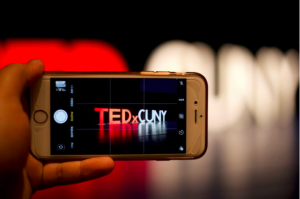
Speakers from across CUNY came together last Friday to remind students that their passions hold power especially during the uncertainty caused by the pandemic.
Journalist Alejandra Ibarra Chaoul kicked off the first digital TEDxCUNY event “Ripple Effects” with an anecdote of why she began her passion project Democracy Fighters.
“In Mexico when a journalist is killed their memory is immediately replaced by the crime that took their life,” says Ibarra Chaoul, “they’re suddenly remembered by what someone else did to them, not by the work they spent years doing.”
Ibarra Chaoul says the Mexican government often leaves these murders unsolved and while the deaths of these reporters physically silence them, their missing work silences a part of the country’s history.
“When the work they had already produced goes missing, I say the entire country loses a part of its history,” says Ibarra Chaoul, whose digital archive attempts to preserve the work of 119 journalists who were killed in Mexico.
Ibarra Chaoul hopes that through her work with the archive, the work of the reporters survives them.
“This fight to preserve reporters memory and dignity I hope will create ripples of its own,” says Ibarra Chaoul.
According to the second speaker Leah Batstone, it can be difficult for students to cultivate their inner passions especially when society has dismissed those interests as an auxiliary past-time.
As a part-time music professor at Hunter College, Batstone has seen the effects of society’s dismissal of the humanities.
“The reluctance of all students, particularly those with financial concerns, to study humanities not only robs them of enhanced perspectives on their own lives,” says Bastone, “but also robs us as a society at large of their insights and experiences which much of academia is sorely lacking.”
Bastone encouraged viewers that investing time into their interests can deepen their creativity and critical thinking as well as focus on their own impact.
“The study of those things that bring us joy, comfort, and insight should be central not on the periphery of our experience, subordinate to making money,” says Batstone, “I encourage you to resist the urge to be practical, investing some of your college career in what you love.”
Not only should students be investing in what they love but also be aware of how their passions can influence their actions, according to Moustafa Bayoumi, a professor at Brooklyn College.
Critically acclaimed author and journalist, Bayoumi said to viewers that the public and their politicians are similar in their ability to turn a blind eye. He urged viewers to not only hold themselves accountable but also their community leaders for such actions.
“It’s time we all show up for one another, says Bayoumi, “because these kinds of actions will help to create a society where a belonging of all kinds becomes a universal act.”
